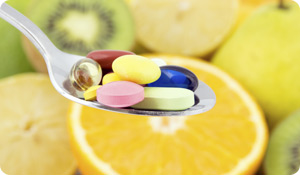
The word "antioxidants" conjures up images of brightly colored carrots, ripe, juicy tomatoes, and plump blueberries, perhaps held by fit-looking individuals with glowing skin and shiny hair. Antioxidants, which are substances that prevent and delay cell damage, are found in fruits and vegetables, but they also come in pill form—vitamin C is an antioxidant, for instance. You may think that antioxidants, are just the thing to reach for if you’re being treated for cancer and want to ensure the best possible outcome.
But don't pop that pill just yet. Consuming antioxidants in pill form may actually be hazardous to your health when you are undergoing cancer treatment, according to recent research published in the Journal of the National Cancer Institute. Scientists say that high doses of antioxidants might interfere with certain cancer treatments, including chemotherapy.
What Antioxidants Do
It’s believed that antioxidants destroy the free radicals or "reactive oxygen species" that damage the DNA in an individual’s cells and can lead to cancer. However, there are many different kinds of free radicals, and recent research suggests that some may be beneficial. As investigators from King’s College London noted, that's because in some instances, free radicals may actually attack harmful pathogens, or infectious agents that cause disease.
This means that there is "growing evidence that antioxidant supplements can, in some circumstances, do more harm than good," as study author Victoria Sanz-Moreno, Ph.D, writes in The Conversation.
Rethinking Free Radicals and Antioxidants
"It’s possible that free radicals are a good thing, particularly when considering their importance in immune responses," agrees Dale Shepard, MD, Ph.D, who works in the department of hematology and oncology at the Cleveland Clinic. "Suppressing the immune-mediated free radicals may be a bad thing. Some chemotherapy drugs work by generating free radicals that attack the dividing DNA of cancer cells to prevent cell division."
Increasing the stores of antioxidants in the body could actually decrease the effectiveness of the chemotherapy, Shepard explains. These antioxidants may not directly make the cancer worse, but they lower the likelihood that the chemotherapy will be effective, Shepard says. So what should people receiving chemo do? While Shepard would not encourage patients to take antioxidant supplements, he doesn't recommend abstaining from antioxidant-rich foods, either.
Instead, follow these food and lifestyle tips to help to maximize the effectiveness of your cancer treatment:
- Consume a varied diet comprised of all food groups in moderation. "Eat foods that contain antioxidants, like grapes, blueberries, green vegetables, and citrus fruits," Shepard says. "These have beneficial vitamins and minerals that are important."
- Make sure your diet includes whole grains, lean proteins, and healthy fats. "And if patients are having difficulty eating adequately due to treatment side effects, nutrition supplements can be very beneficial to optimize intake," says Alisha Polewarczyk, MPH, RD, a clinical dietician at Montefiore Medical Center in New York City.
- Take precautions to avoid infection. Practice safe food handling procedures and washing your hands, Polewarczyk recommends.
- Develop an exercise routine and try to stick to it. "The stronger you are physically, socially, and emotionally, the better it is for your health," says Robert Graham, MD, an internist specializing in Integrative Medicine at Lenox Hill Hospital in New York City. Additionally, moderate exercise has been shown to fight fatigue, he says.
- Practice stress reduction techniques. "Minimizing stress is very important," Graham says. "Once you get cancer, it is a part of you. You need to learn to accept it and to reduce anxiety and stress."
Dale Shepard, MD, reviewed this article.
Sources
Polewarczyk, Alisha, MPH, RD. Email interview on October 29, 2015.
Shepard, Dale, MD. Email interview October 28, 2015.
Graham, Robert, MD. Phone interview on October 27, 2015.
Herraiz, Cecelia, et al. "Reactivation of p53 by a Cytoskeletal Sensor to Control the Balance Between DNA Damage and Tumor Dissemination." Journal of the National Cancer Institute. October 2015.
Sanz-Moreno, Victoria. "Why Antioxidants Might Actually Make Your Cancer Worse." The Conversation. October 16, 2015.
"Antioxidants and Cancer Prevention." National Cancer Institute. Reviewed January 16, 2014.





